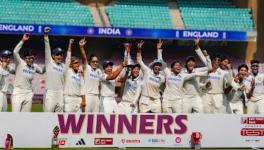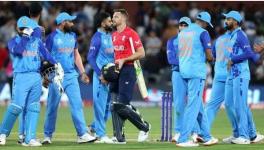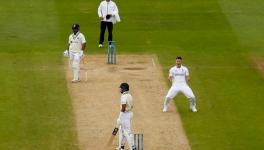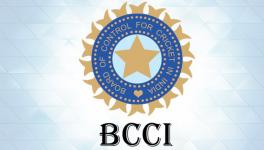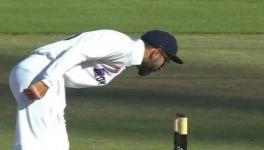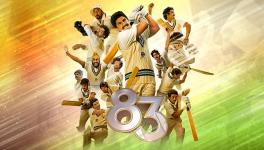70 Years of Indian Cricket: Shahid Durrani and His Tryst With the Game’s History

Shahid Ali Khan Durrani
In 70 years, from 1952, when Lucknow hosted the first ever Test match, and June 14, 2022, when the Indian Premier League (IPL) media rights were sold for a record Rs. 48,390 crore for the 2023-27 period, Indian cricket has scaled many heights. The success has been both in terms of glory attained by the national team and the financial muscle it has gained over the years. Today, India is among the top teams in all three formats of the game while the Board of Control for Cricket in India (BCCI) is the richest national board in the world.
Twenty years after India played their first ever Test match in 1932, against England at the Lord’s, Uttar Pradesh’s capital, Lucknow, played host to the first of the three Tests it has staged till date. And one man who was involved in that Test and has seen Indian cricket grow from humble beginnings to what it is now is Shahid Ali Khan Durrani. The Lucknow-based retired Group Captain of the Indian Air Force was a volunteer during the India-Pakistan Test held at Gomti Ground – also referred to as the Lucknow University Ground – in 1952.
Even today, the 85-year-old former India manager follows cricket closely. And he is happy to see Indian cricket grow by leaps and bounds. “The progress of Indian cricket between 1952 and now has been phenomenal and mind boggling. In 1950s and until the middle of 1960s it used to be a leisurely pastime of a few elite – the rajas, maharajahs, and the nawabs. Since then it has grown into a full time business venture, bringing in the likes of Tatas, Ambanis, Adanis et al,” Durrani, a former secretary of the Services Sports Control Board (SSCB), tells NewsClick in an exclusive interview at his Lucknow residence.
Also Read | Making Sense of India’s Asian Cup Entry and Coach Igor Stimac’s New Found Verve to Talk his Mind
Cricket has undergone a sea change in India – and in the rest of the world -- during these seven decades. Durrani cites the phenomenal growth of Indian cricket to a variety of factors. “I shall attribute this to the advent of television in India and gradual decline of the standard of hockey in our country. Cricket in India is now a full time business venture, raking in moolahs in billions of dollars year after year. Administrators and players are having a ball – quite naturally,” says the former hockey captain of Lucknow University.
On June 14, the media rights of the IPL were sold for an unprecedented Rs.48,390 crore, which made the T20 league, in terms of income per match in the sporting world, behind only the National Football League (NFL).
“The progress of cricket in India in the past 70 years is like a dream come true. Both administrators as well as players fully committed in their respective spheres. The BCCI is being run and managed in a highly professional manner, thereby making it the richest cricket body. This enables it to dictate terms at will to the other ICC member countries,” says Durrani.
Durrani has had the advantage of having been involved with the BCCI, the SSCB, and the Indian Air Force, and the 1982 Delhi Asian Games. Thus, he was aware how the system worked from the inside. He was with the Air Force from 1958 to 1983, when he took premature retirement and returned to his hometown, Lucknow.
********
Amongst the highs that occurred during Durrani’s active days was India winning the 1983 World Cup. Three other dramatic incidents stand out in his career in cricket. The Sunil Gavaskar walkout during the Melbourne Test in 1981 is, of course, well documented. But how Durrani was “elected” as the Indian cricket team’s manager for that tour, as well as his appointment as the SSCB secretary, have never been written about.
Durrani has now chosen to reveal how he was “elected” the India manager. “Until today, the general perception has been that I was ‘appointed’ manager whereas the fact is that I was elected. After nearly 42 years, I am presenting the facts down for posterity with a sense of gratitude to my supporters who helped me to make it and also to those who didn’t support my candidature,” Durrani said.
Also Read | Cramping Period: To Talk or Not to Talk — the Perpetual Menstrual Gag
Durrani was, as Wing Commander, in-charge of an Air Force Station in Sambra, Belgaum, in Karnataka when he was selected as SSCB secretary. Three Air Force officers were shortlisted for the post, Group Captain Hemachandra Tukaram ‘Bal’ Dani and Wing Commander VM Muddiah being the others. “How I made it to this post is still a mystery to me. My QRS for this post boasted only being a [hockey] colour holder from Lucknow University and diploma Class I [hockey] from National Institute of Sports in Patiala. Nevertheless, I was selected and took over in April 1978, and the rest is history,” he says.
As SSCB secretary Durrani had a vote in the BCCI as it was a full member of the Board, and he was entitled to attend BCCI meetings. In September 1980, the BCCI convened its annual general body in Hyderabad. Its agenda also included ‘selection’ of managers and assistant managers for the upcoming tours of Australia, New Zealand and Fiji, and of India ‘A’ team’s visit to Pakistan.
“At this stage, I got a brainwave – to become a candidate for the manager’s post for the Australia-NZ tour. To start with, I discussed this with Mr. Phalguni Matilal, secretary of the Railway Sports Control Board, and Mr. GS Sivia, secretary of the Combined Universities Sports Control Board. Both gentlemen encouraged me to go ahead, pledging their full support,” he recalls.
Also Read | How to Kill Home Advantage, the Indian Football Way
Durrani then contacted Punjab Cricket Association president Inderjit Singh Bindra, Ram Prakash Mehra (Delhi), Ranbir Singh Mahendra (Haryana), and Kanwal Kaul (Jammu and Kashmir Cricket Association), and they all extended their full support. That made it six confirmed votes, including Durrani’s, from the north zone. With seven “confirmed” votes, including two from the central zone, he contacted Jagmohan Dalmiya of the Cricket Association of Bengal in the east zone, which had five votes. “Besides his own vote, Dalmiya promised the remaining four votes from the east zone. With 12 confirmed supporters, I was still short of the majority in a house of 28. Nevertheless, undaunted, I decided to contest,” he says.
The other candidate for the manager’s post for Australia-NZ tour was Keki Tarapore, propped up by Ghulam Ahmed, then secretary of the BCCI, with full support of the west and the south zones. “At the AGM, my candidature was proposed by Sivia, Matilal, and RP Mehra. Before the voting took place, Maharaja Fatehsinh Rao Gaekwad, representing Baroda, asked me to withdraw my candidature with a promise of the manager’s post of the India ‘A’ team’s tour to Pakistan,” discloses Durrani.
“I turned down the proposal, telling him that I would rather fight and lose than turn my back to the fight. Eventually, when the voting took place I managed the majority of votes comfortably,” he recalls. Bapu Nadkarni was appointed assistant manager to Durrani while RP Mehra and Chandu Borde were named manager and assistant manager respectively of India ‘A’s tour of Pakistan.
********
India famously drew the three-Test series in Australia, coming from behind to win the third match in Melbourne after the Gavaskar walkout incident. Durrani played a pro-active role to diffuse the explosive situation that emanated from the walkout.
After that four-and-a-half-month long tour, Durrani was handpicked for the 1982 Delhi Asian Games and got involved in its preparation. He was appointed a Director (Protocol), a sensitive assignment that entailed liaising with diplomats of various countries for the Games. For this role, he was awarded the Asian Vishisht Jyoti medal, presented to only 22 people involved with organising the Asian Games. Earlier that year, the Indian government had awarded him the Vishisht Seva Medal.
Durrani quit the Indian Air Force prematurely, in January 1984, and returned to Lucknow. “When I left, I was Group Captain. If I had continued I would’ve got one more rank, of Air Commodore, equivalent to a Brigadier. There was an opening at a public sector undertaking in Lucknow [UPTRON], and I wanted to be with my family and son whom I wanted to be with the defence forces and that would have given me more opportunity to guide him. He got selected in his first attempt in the Army as a commission officer,” he explains. In Lucknow, Durrani remained involved in local cricket, including organising the Times League, one of the most successful tournaments of the city.
For all his accomplishments, Durrani remains humble. “To be honest, my contribution towards the transition of Indian cricket is nil, or maybe negligible, except during the 1978-1982 period at the national and international level, which is now a part of history. Being a commissioned officer in the Indian Air Force from 1958 to 1983 gave me little scope to venture out elsewhere on a full time basis. All through, I was fortunate to be associated with cricket at various levels and this continues even today,” he underlines.
(The author is a cricket reporter based in New Delhi who has covered the sport for over three decades)
Get the latest reports & analysis with people's perspective on Protests, movements & deep analytical videos, discussions of the current affairs in your Telegram app. Subscribe to NewsClick's Telegram channel & get Real-Time updates on stories, as they get published on our website.










